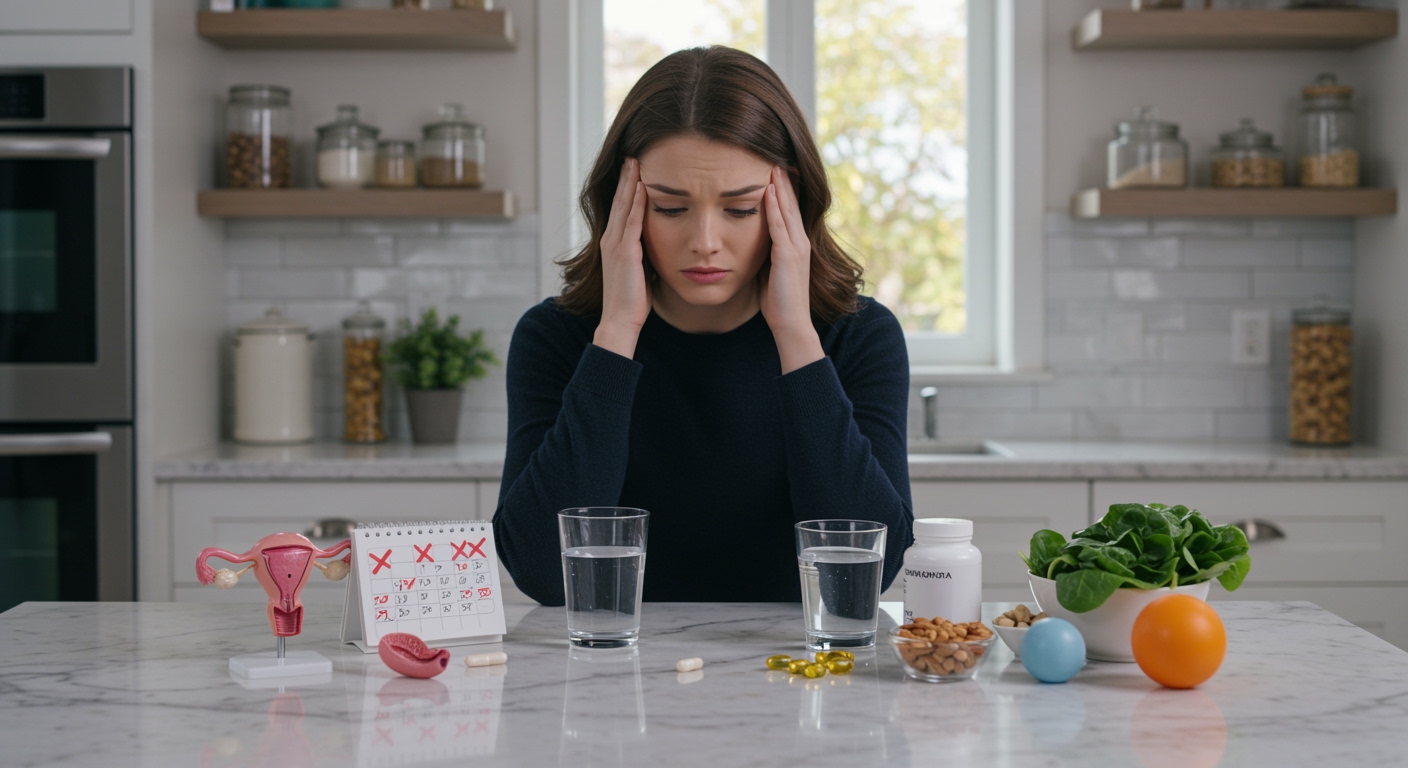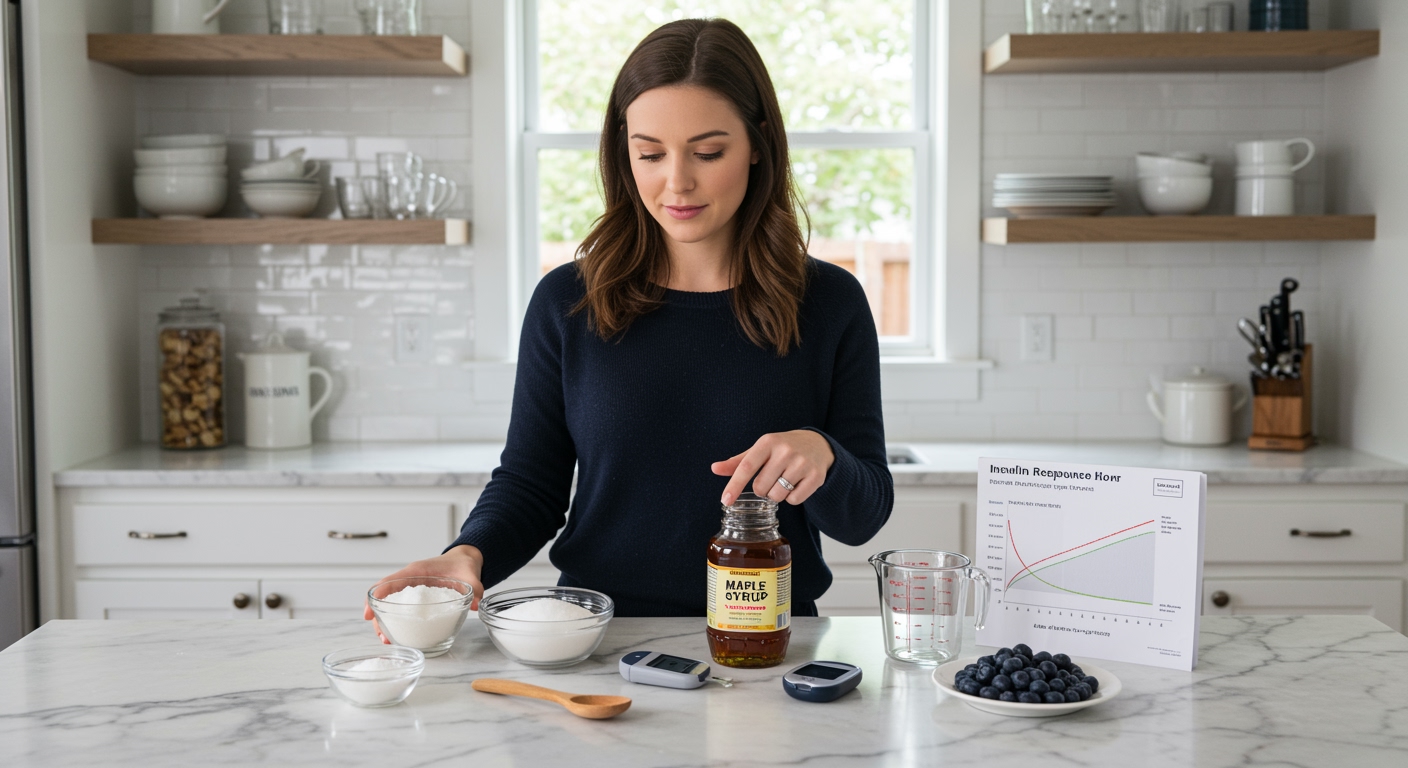✪ Key Takeaway: PCOS significantly worsens PMS symptoms and mood swings through insulin resistance and hormonal imbalances.
Introduction
Your period approaches and suddenly you feel like a completely different person.
You might be wondering if your PCOS diagnosis explains why your PMS symptoms feel so much more intense than what your friends describe.
Hi, I’m Abdur, your nutrition coach and today I’m going to explain exactly how PCOS amplifies PMS symptoms and creates severe mood swings that can disrupt your entire life.
How Does PCOS Change Your Menstrual Cycle?
PCOS disrupts your normal ovulation process through elevated androgen levels and insulin resistance.
When you don’t ovulate regularly, your body produces less progesterone, the calming hormone that normally balances estrogen.
This hormonal imbalance creates a perfect storm for severe PMS symptoms because your body lacks the natural mood-stabilizing effects of adequate progesterone.
Your irregular cycles mean that when periods do arrive, the hormonal fluctuations are more dramatic and unpredictable.
Research shows that women with PCOS experience PMS symptoms that are significantly more severe than women with regular cycles.
The unpredictable nature of PCOS cycles also means you cannot prepare mentally or physically for these intense symptoms.
✪ Fact: Women with PCOS are three times more likely to experience severe PMS symptoms compared to women without the condition.
Why Do Mood Swings Become So Extreme With PCOS?
Your brain contains receptors for insulin, estrogen, and testosterone that directly affect neurotransmitter production.
PCOS creates insulin resistance, which disrupts how your brain produces serotonin and dopamine, the chemicals responsible for mood regulation.
High androgen levels in PCOS also interfere with the production of GABA, a neurotransmitter that promotes calmness and relaxation.
When your period approaches, the already unstable hormone levels fluctuate even more dramatically, creating intense emotional volatility.
The combination of low progesterone, high androgens, and insulin resistance creates a neurochemical environment that makes mood swings feel overwhelming and uncontrollable.
Many women describe feeling like they are watching themselves have extreme reactions but cannot stop the emotional rollercoaster.
✪ Pro Tip: Track your mood patterns alongside your cycle to identify your personal triggers and prepare coping strategies in advance.
What Role Does Insulin Resistance Play In PMS Severity?
Insulin resistance affects approximately 70% of women with PCOS and directly impacts blood sugar stability.
When your blood sugar levels fluctuate wildly, your body releases stress hormones like cortisol and adrenaline to compensate.
These stress hormones amplify PMS symptoms by increasing anxiety, irritability, and emotional sensitivity during your premenstrual phase.
Insulin resistance also promotes inflammation throughout your body, including in your brain, which worsens mood-related symptoms.
The inflammatory response triggered by insulin resistance can make you feel physically uncomfortable and emotionally unstable during PMS.
Your body’s inability to efficiently use glucose for energy also contributes to the fatigue and brain fog that often accompany severe PMS in PCOS.
✪ Note: Stabilizing blood sugar through proper nutrition can significantly reduce both PCOS symptoms and PMS severity.
Can You Reduce PCOS-Related PMS Symptoms Naturally?
Improving insulin sensitivity through dietary changes forms the foundation of managing PCOS-related PMS symptoms.
Focus on eating balanced meals with protein, healthy fats, and complex carbohydrates to maintain stable blood sugar levels throughout your cycle.
Regular physical activity, especially strength training and moderate cardio, helps improve insulin sensitivity and reduces inflammation.
Omega-3 fatty acids from fish, walnuts, and flaxseeds can help reduce the inflammatory response that worsens PMS symptoms.
Magnesium supplementation may help improve mood stability and reduce cramping, while vitamin D supports overall hormonal balance.
Stress management techniques like meditation, yoga, or deep breathing exercises can help regulate cortisol levels and improve emotional resilience.
Adequate sleep becomes even more crucial for women with PCOS because poor sleep worsens insulin resistance and hormonal imbalances.
✪ Pro Tip: Start implementing these changes gradually during your non-PMS days to build sustainable habits that support long-term hormonal health.
The Bottom Line
PCOS absolutely can cause severe PMS and mood swings through its complex effects on hormonal balance, insulin sensitivity, and brain chemistry.
Your hormones are not your destiny, but understanding them gives you the power to take control and create meaningful improvements in your quality of life.
I would love to hear about your experiences with PCOS and PMS symptoms, or answer any questions you might have about managing these challenges naturally through nutrition and lifestyle changes.
References
At NutritionCrown, we use quality and credible sources to ensure our content is accurate and trustworthy. Below are the sources referenced in creating this article:
- PMC: PCOS and Mood Disorders Research
- Tandfonline: PCOS Effects on Mood
- PMC: Hormonal Imbalances and PMS
- Mayo Clinic: Premenstrual Syndrome Symptoms





